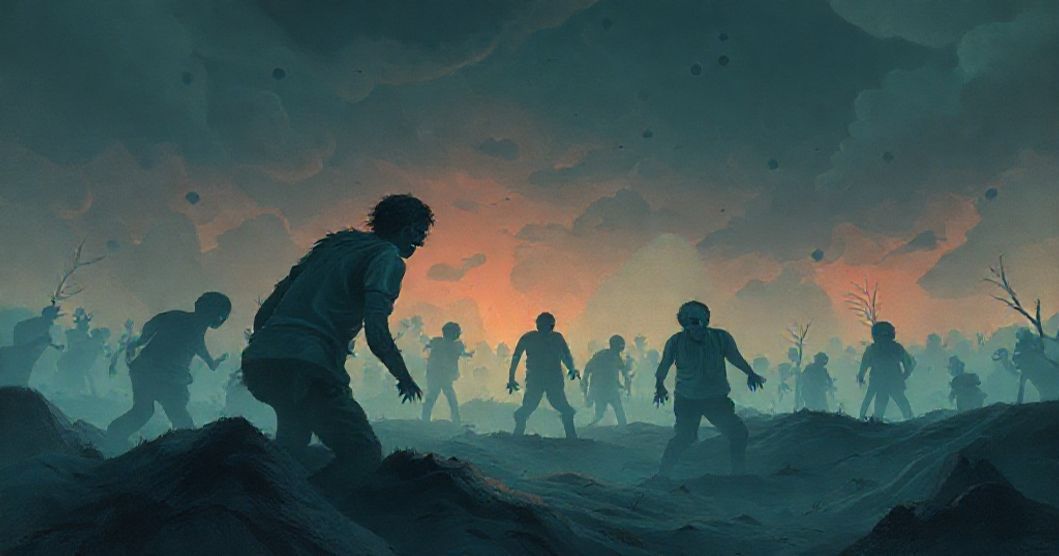Part 1: Dream Presentation
Dreams that repeat like a broken record often carry urgent messages from our unconscious, and this recurring zombie nightmare is no exception. Let’s explore the vivid narrative that has haunted the dreamer five times in two months:
I woke with a gasp, the dream’s terror still clinging to my skin like a physical weight. This recurring nightmare has haunted me five times in the past two months—a first for me, as I’ve never experienced such relentless repetition. The setting always begins in a familiar yet unsettling house, filled with faces both known and unknown, strangers and people from my waking life, all caught off guard as the zombies surge in.
The first, unchanging moment is the woman—a stranger, though her face feels oddly familiar, like someone I once knew but can’t place. She panics, rushing toward the door, and as she reaches the threshold, a zombie’s clawed hand severs her torso in a sickening, visceral spray of... I can’t name it, but I feel it. The sound is a wet, tearing rending, and her scream cuts off abruptly. I try to wake myself before she dies, but my mind clings to the dream’s grip, forcing me to witness the aftermath.
Want a More Personalized Interpretation?
Get your own AI-powered dream analysis tailored specifically to your dream
🔮Try Dream Analysis FreeHer family—two children, a husband—collapses into sobs, their grief palpable even in the dream’s unnatural stillness. I scramble to the stairs, shoving a heavy wooden dresser in front of the entrance as zombies begin their climb. The wood scrapes against the floor, a sound that feels too real. Then, another stranger assumes command, a man with a determined set to his jaw, shouting for everyone to climb onto the roof. This is the only variable: sometimes I stay on the original house’s roof, watching zombies press against the windows, their fingers reaching through the glass; other times, I leap to an adjacent rooftop, but the outcome remains the same.
We huddle there, exposed, as zombies claw at the edges of our perch. There’s no escape, no weapons, only the knowledge that any moment could mean falling. In some versions, I force myself awake during this tension; in others, I see people plummeting from the roof, their screams echoing like the 9/11 jumpers I’ve seen in documentaries. The zombies themselves are disturbingly realistic—matted hair, decayed flesh, eyes vacant but ravenous. The house feels like a tomb, the air thick with fear and decay.
Part 2: Clinical Analysis
Symbolic Landscape: The House, Zombies, and Survival
The house in this dream functions as a powerful symbol of safety and vulnerability. Its familiar yet unsettling nature suggests a space that should feel secure but instead evokes dread—a metaphor for waking life environments that harbor hidden threats. The zombies, with their ravenous, shambling nature, represent primal fears: the unknown, decay, and loss of control. Their realistic, visceral appearance indicates these fears are not abstract but deeply felt in the dreamer’s psyche.
The woman’s death—always the first casualty—carries particular weight. Her sudden, gruesome end mirrors the dreamer’s fear of sudden loss or betrayal in relationships. The family’s grief and the husband’s collapse into tears highlight the dreamer’s concern for emotional safety and the fragility of bonds. This sequence suggests the dreamer is processing unresolved grief or fear of abandonment.
The act of barricading the stairs with a dresser embodies the human response to perceived threats: attempting to create boundaries, to fortify what feels vulnerable. This symbolic action reveals the dreamer’s desire to control chaos, even as the zombies breach the defenses—a metaphor for how external pressures (work, relationships, life changes) feel inescapable despite our best efforts to contain them.
Psychological Perspectives: Jungian, Freudian, and Cognitive Lenses
From a Jungian perspective, the recurring zombie dream may reflect the dreamer’s shadow self—unintegrated parts of the psyche that feel threatening or
